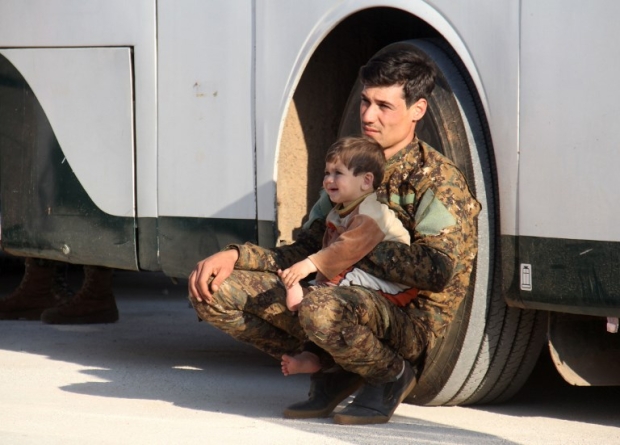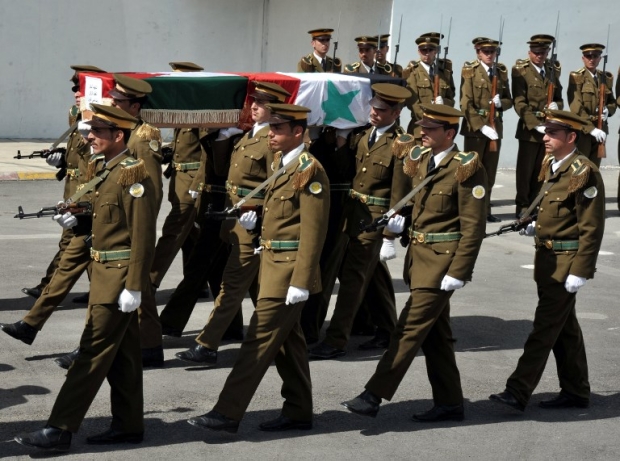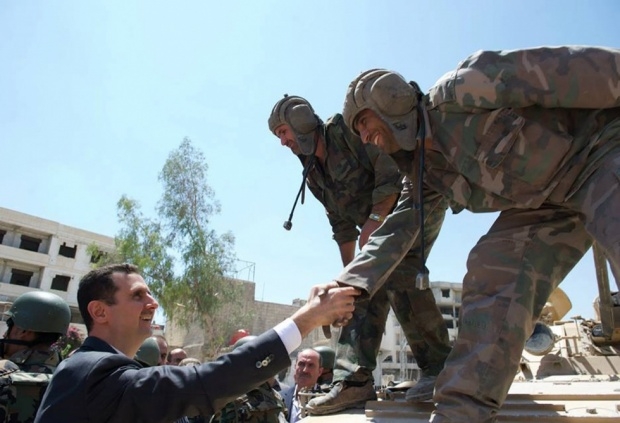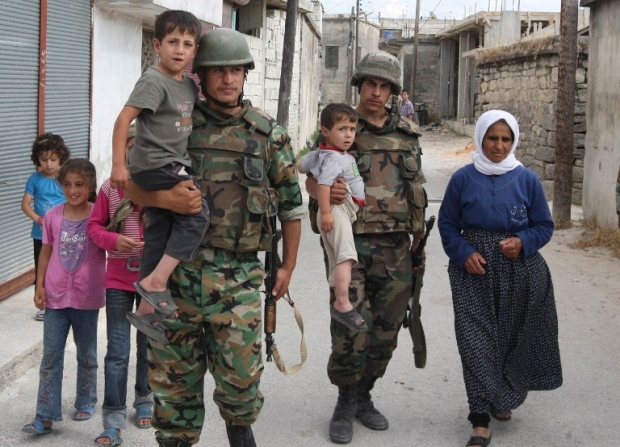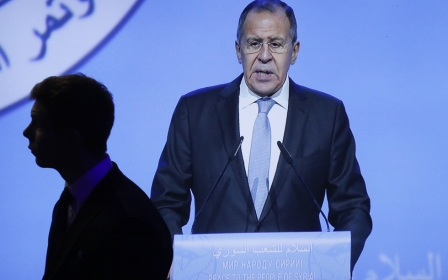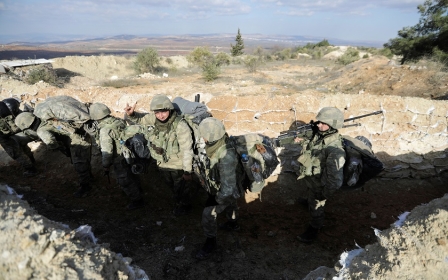'Nothing for his sacrifice': Families of missing Syrian soldiers left in limbo

When Tawfiq reached the bus station in central Syria’s Homs city on 12 February 2014, he called his wife Suad, as he always did after making the journey south from their home in Hama province.
Tawfiq, a commander in the Syrian Arab Army (SAA) who worked at a state security branch in Homs, told Suad that he had returned safely from his biweekly trip to visit her and their four children.
Later that evening, Suad called to speak to Tawfiq again, but received an out-of-service response. Immediately, she recalled a special army assignment he mentioned while at home.
'If he had known that after all he did for the sake of the homeland, his life would be taken like this, would he have stood by the regime?'
- Suad, wife of missing Syrian soldier
She grew concerned and called one of her husband’s colleagues at the security branch. He confirmed Tawfiq was out on a mission and would call her back when he returned.
“My heart started racing,” Suad told Syria Direct. She continued to call her husband throughout the night, but he didn’t respond. The silence stretched into days.
“I told myself that his phone was probably dead, or that he was somewhere without reception," she said.
Three days after Suad first tried to reach her husband, she said an employee at the security branch called Suad to let her know that Tawfiq still hadn’t returned and asked her to inform the branch if he showed up at home or tried to contact her.
Four weeks passed without a word from Tawfiq, and Suad noticed that his monthly salary, usually transferred to a government-issued bank card, did not arrive.
An officer at the Homs security branch where Tawfiq worked told Suad that because her husband was registered as a missing person, he would no longer be paid.
“Pray for him to return,” she recalled the officer telling her. “We can’t register him as a martyr because he went missing.”
When Syrian Arab Army soldiers are confirmed killed in the ongoing civil war, they are officially registered as martyrs - a term used both colloquially and officially in Syria to describe victims of the war. Their families are entitled to an array of state benefits, including financial compensation, a monthly salary and medical care.
But for the families of SAA soldiers who disappear - who, together with civilians, are estimated to total around 60,000, according to the International Commission on Missing Persons - no such privileges exist.
Instead, three families told Syria Direct that they face both the pain of losing a loved one and the difficulty of navigating a legal system that offers little guidance or support.
‘No offices to visit’
When employees at Tawfiq’s former workplace told Suad that her missing husband would no longer receive a salary, she said she was at a loss for what to do.
At the suggestion of friends, her next step was to visit the government’s Office for Martyrs’ Affairs in Homs city, but once there, she was told there was nothing they could do to help her.
“Your husband isn’t a martyr, he’s missing,” she recalled them saying.
Like Suad, the other two families of missing SAA personnel whom Syria Direct spoke with said they are unaware of any government entity specifically devoted to the issue of missing soldiers.
Emad went missing as battles raged near a checkpoint where he was stationed in the Hama countryside, she said.
Firas al-Dimashqi, a Damascus-based lawyer who has worked on several missing persons cases, confirmed that there is, in fact, no office specifically dedicated to supporting families.
Instead, any available information regarding a missing soldier’s status is provided by “those who were with [him] on the battlefield, or from the army command”, he said.
Al-Dimashqi asked to be identified by a pseudonym due to the sensitivity of discussing government-related matters. For similar reasons, the relatives of missing soldiers whom Syria Direct spoke with for this report asked to be identified only by their first names.
Khayrea, who now lives with her two-year-old son and relatives in Damascus, said she frequently visits an SAA office in the capital to inquire about her husband and inform the office about the financial difficulties she faces raising a child in his absence.
All Khayrea has been told is that Emad’s death could not be confirmed, she said. At the SAA office, “they asked me: ‘Do you really want us to record him as dead just for the salary?’”
“No one is concerned with our situation,” she said.
Syria Direct spoke by phone with the Syrian Ministry of Defence in Damascus six times over the course of two weeks before being told that a comment could not be given to an organisation based in Amman.
Martyr benefits
More than 60,000 government troops have been killed during the war, the UK-based monitor Syrian Observatory for Human Rights has estimated.
The Syrian government pledges to provide the families of these soldiers with various benefits including a full salary for parents of an unmarried martyr, job offers for widows and children, funds for burial, healthcare and free public transportation.
Before the war, the benefits were much more extensive including a one-time payout, housing and special schools for the children of martyrs, al-Dimashqi said.
“Now, the family of a martyr is given a wall clock, a goat or boxes of oranges as a tribute,” al-Dimashqi said. “The matter has become farcical.”
Still even the reduced entitlements for the martyrs' families surpasses anything provided to the three families who spoke with Syria Direct.
'Now, the family of a martyr is given a wall clock, a goat or boxes of oranges as a tribute. The matter has become farcical'
- Syrian lawyer in Damascus
Suad said she received documents identifying her husband as a missing person following a visit to the Department of Social Affairs in Homs. She shows them to charities and sometimes they offer blankets and basic food products.
To support the family, she does handiwork from home while her teenage son, Adham, has dropped out of school to work as a carpenter’s assistant.
But they are still struggling to get by.
‘No justice’
One option for families of missing soldiers seeking access to government benefits is to have their relative declared dead through the courts. However, the process is lengthy and success rates are low, legal sources told Syria Direct.
“Syrian law has been, overall, limited with regard to the topic of missing persons,” said Muhammad Nour a-Deen al-Hamidi, a former judge who defected from the Assad government in 2012.
Article 205 of Syrian personal assets law stipulates that if a person is missing “because of war operations or similar situations”, they will be considered dead after a period of four years.
In order to obtain a death certificate, however, al-Hamidi said families need to raise a court case which they can only do at least four years after their relative goes missing.
“The families can obtain all of their rights,” added the former judge, “if they win.” Al-Hamidi said he presided over a successful case of this type before his defection.
Missing persons cases were relatively common prior to the outbreak of the war, al-Dimashqi, the Damascus-based lawyer, told Syria Direct.
“They had a high success rate,” he said, “if the missing person’s security record was clean.”
“The state is running from its financial obligations due to the war and the increase in missing persons and martyrs," said al-Dimashqi.
The lawyer believes that a decline in missing person cases may also be due to the possibility that a soldier who disappeared defected from the army.
Abu Saeed, a high school physics teacher in Damascus, told Syria Direct that he has faced doubts over his son Saeed’s loyalty to the government since he went missing in 2013.
Six months after Saeed first disappeared from a Syrian army base in Damascus’s East Ghouta suburbs, his father said he received a call from the army’s social affairs department. They asked if Saeed had been in touch with him.
“They told me, ‘Maybe your son defected from the regime and joined the terrorists,’” he said.
“To be honest, I wish that was the case. It would preferable to him being dead.”
While it has been more than four years since Saeed disappeared, his father doesn’t see going to court as a realistic option. He fears the fees required to raise a case would exceed any compensation he might receive.
“Our country is at war and in chaos,” he said. “There is no justice.”
'Live with dignity'
For the families of the missing, the designation of “martyr” is significant not only for the privileges associated with it, but also for the recognition that a family member was lost for a noble cause - in this case, defence of the homeland.
“The wife of a martyr is respected and valued wherever she goes,” Suad said. Some days, she tries to imagine what life would be like if her husband’s body were found, and his name recorded on the list of martyrs.
“We would be able to live with dignity,” she said.
Abu Saeed, whose son was accused of joining the opposition, feels similarly betrayed.
“My son went to serve his army, and maybe he died five years ago,” he said. “No one will admit that he gave his life to save the homeland.”
Read the original article on Syria Direct. Follow Syria Direct on Twitter.
New MEE newsletter: Jerusalem Dispatch
Sign up to get the latest insights and analysis on Israel-Palestine, alongside Turkey Unpacked and other MEE newsletters
Middle East Eye delivers independent and unrivalled coverage and analysis of the Middle East, North Africa and beyond. To learn more about republishing this content and the associated fees, please fill out this form. More about MEE can be found here.


